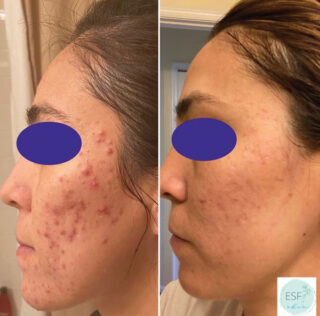
University Commerce Center
44927 George Washington Blvd
Suite #250
Ashburn, VA 20147

More Beauty Skin Care & Gorgeous Smiles Articles
Acne and Mental Health

Manage Your Acne and Improve Your Well-Being
Acne is a common skin condition that affects many people, particularly during adolescence. It is caused by the clogging of hair follicles with dead skin cells and oil, leading to the formation of pimples, blackheads, and whiteheads. While acne is often considered a cosmetic issue, it can have a significant impact on an individual’s mental health and well-being.
Acne can cause emotional distress, low self-esteem, and anxiety, leading to a negative impact on an individual’s social life, school, and work. It can be particularly challenging for adolescents, who are often experiencing a range of physical and emotional changes. The psychological impact of acne can be severe, leading to depression and social isolation.
Fortunately, there are ways to control acne and improve mental health. The first step is to understand the causes of acne and how it can be treated. The second step is to find the right combination of products that can unclog pores, keep them unclogged, and kill acne bacteria.
Diet plays a crucial role in the development of acne. A diet high in refined carbohydrates and sugar can cause a spike in insulin levels, leading to increased sebum production and inflammation. It is advisable to opt for a balanced diet that includes plenty of fruits, vegetables, and lean proteins, while avoiding processed and sugary foods.
Hormonal imbalances can also contribute to acne. High levels of androgens, such as testosterone, can cause an increase in sebum production, leading to acne breakouts. Hormonal contraceptives or medications that regulate hormone levels can help manage acne.
Lastly, making lifestyle adjustments can also help manage acne. Washing the face twice a day with a gentle cleanser, avoiding picking or squeezing acne lesions, and using non-comedogenic skincare products can help reduce the occurrence of acne breakouts.
Overall, a combination of dietary modifications, hormonal regulation, and lifestyle adjustments can make a significant difference in managing and preventing acne. However, it is always advisable to consult a professional for a personalized acne management plan.
In addition to a regular home-care routine, bi-monthly treatments can also help to facilitate the clearing of acne. It is important to remember that controlling acne takes time and patience. A clear-skin system typically takes about 3-4 months to see significant improvement, depending on the severity of the acne. It is also important to be consistent with a skincare routine, and to avoid picking or squeezing pimples, which can lead to scarring and further breakouts.
With the right approach, clear skin and improved mental health are achievable goals.
Other Articles You May Find of Interest...
- Longevity Supplements: Improving Medical Practitioner Care & Functional Medicine in 2024
- Rejuvenate Your Skin: How Cutting-Edge Science Transforms Personalized Skincare
- Five Options for an Improved Neck Contour
- Can You Benefit From Braces?
- Exploring the Safety and Effectiveness of CoolSculpting Treatments
- How to Prepare for Your Visit to the Dermatologist
- What’s the Right Age To Have Cosmetic Surgery?

















